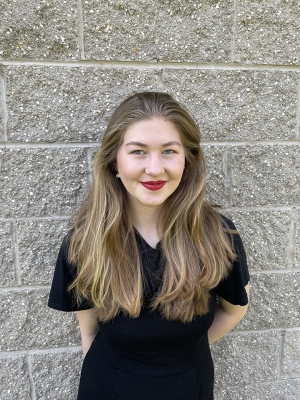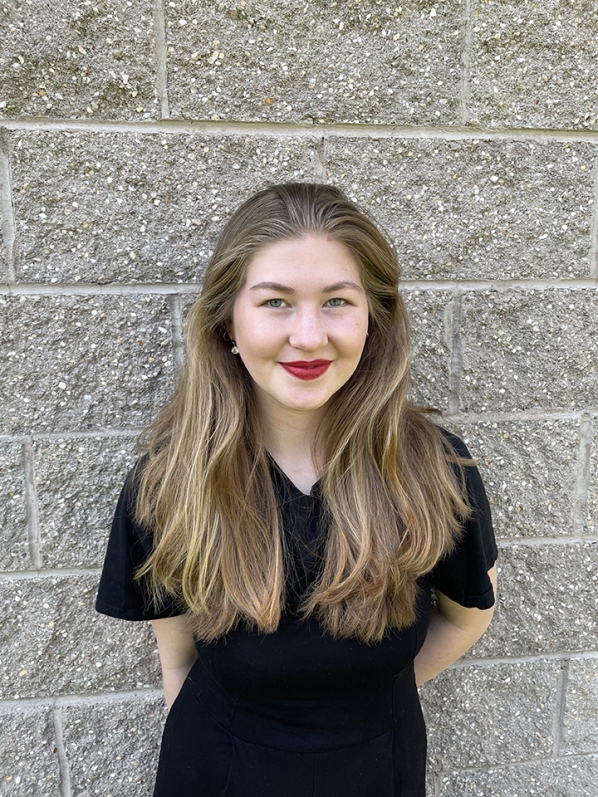Jenna Elliott ’21 has successfully passed the Diplomas de Español como Lengua Extranjera (English: Diplomas of Spanish as a Foreign Language), or DELE Spanish Language Certification Level C1 exam. Elliott graduated in May of 2021 with a bachelors degree in languages, literatures, and cultures: Spanish, and double minors in applied linguistics/Teaching English as a Second Language (TESL) and communication sciences and disorders. Currently at Appalachian, she works on her Master of Arts in romance language with a concentration in Spanish college teaching. Also, in her role of graduate teaching assistant, she is teaching Beginning Spanish (SNH 1010). She shared,
“I think everyone should learn another language. Learning another language has always been a goal of mine since I was young and getting a BA in Spanish was the product of my dedication to learning the Spanish language. I always tell my students that they need to have patience with themselves and making mistakes is a normal part of learning a language. It is a difficult process that is unlike learning most other subjects, but it is very rewarding and can have a lot of benefits in the future especially relating to travel and work opportunities.”
According to the DELE website, “The DELE C1 guarantees that the student has made successful progress in the language, and certifies more than an advanced level of Spanish.” As Elliott explains, “The C1 exam is an official exam developed by the Instituto Cervantes in Spain. It is the official Spanish language exam. If you want to teach or work in Europe, having a DELE certificate can help prove your ability in Spanish to future employers. If you think you are at a C1 level, which is classified as Effective Operational Proficiency or Advanced, then you take the exam and either pass or fail depending on how you do. As a sidenote, C1 is the second highest classification you can receive. C2 is the highest, but it is considered the master level and even most native Spanish speakers would not pass without years of very technical Spanish education.”
According to Dr. Kevin Kennedy, professor of German and Interim Chair, Department of Languages, Literatures and Cultures (DLLC), “Just over half of those that take the C1 pass it!” Elliott shared how she prepared and succeeded. “To prepare, I bought one of the most highly rated study books. I started studying about two months before the exam. About once a week I would do one of the practice sessions from the book to familiarize myself with the exam structure and concepts. I attribute my success to just practicing the language as much as possible every day. I think speaking Spanish with my classmates and friends gave me the opportunity to improve my language skills in a natural way. While the practice book did help me get familiar with the exam structure, practicing my Spanish as much as possible in a Spanish-speaking environment (La Universidad de Salamanca, Spain) was what really helped me pass.”
As an Honors student, Elliott had the incentive to study abroad in order to meet the Honors International Education requirement. In the summer of 2019, Elliott traveled to Spain to study at the University of Salamanca for six weeks. She described her experience as pivotal: “I didn’t know anyone in the program, and the experience really pushed me to become self-reliant on my Spanish skills and improved my confidence.” As a graduate student this past Fall 2021 semester, she returned to the University of Salamanca for a full semester. She shared, “This recent experience really improved my Spanish skills and ultimately contributed to my being able to pass the DELE C1 exam.”
Elliott discussed the “essential” role and importance of study abroad for Honors students. She said,
“Study abroad is essential if you are studying a language because it gives you the opportunity to practice that language in its natural environment. You can only learn so much from a textbook, and studying abroad while learning a language really contextualizes everything and can help you improve a lot in a short amount of time. If you aren’t learning a language, studying abroad is still useful because it helps to expand your worldview.”
During her time in Honors at App State, Elliott completed two thesis projects, one for the Honors College and a second for Spanish departmental honors in the DLLC. For her Honors College thesis, she studied, “The Semantics of Emotion Across Language: English-Spanish Language Transfer in Emotion Words” directed by Dr. Catherine Fountain, professor in the Department of LLC, and Dr. William Atkinson, professor in the Department of English as her second reader. For her Spanish departmental honors thesis, “Voice Onset Time in Spanish-English bilinguals,” she worked with Dr. Benjamin Souza, associate professor in the Department of LLC as her director, and Dr. Mary-Caitlyn Valentinsson, visiting assistant professor in the Department of Anthropology as her second reader.
Elliott explained how the faculty mentorship she has received at App State has been paramount to her success. She highlighted, in particular, the mentorship of three faculty members in the DLLC: Drs. Fountain, Souza, and assistant professor Paul Sebastian. Of their roles, she stated:
I attribute a lot of my success to three specific faculty members in the Spanish/LLC department. Dr. Souza and Dr. Fountain both have been instrumental in my Spanish education and have helped me cultivate my passion for linguistics. Dr. Souza’s style of teaching has always clicked with me, and I aspire to one day be as organized and well-read as he is. Dr. Fountain is the reason I joined the accelerated admissions program and was able to go to Spain in the first place. I can only hope to one day inspire and push my students as much as Dr. Fountain has inspired and pushed me. Finally, Dr. Sebastian has shown me what it means to be a teacher. I have never met anyone who is so obviously doing exactly what he is meant to be doing, and I hope to one day be as caring and compassionate as he is with his students.
In addition, Elliott gives credit to her parents for always encouraging her language learning, and for helping her to understand the value and importance of travel and learning another language. She shared, “They really helped me to establish those as values.”
As Elliott pursues her masters in Spanish College Teaching, she aims to have the opportunity to teach classes at the college level. Additionally, her academic work at App State has helped her to identify her passion and talent for linguistics. She is now applying to MA programs in Linguistics and Forensic Linguistics with the goal of developing these skills further and making a career in teaching or researching linguistics. For now, she stated, “I am currently trying to keep my options open.”
Top photo of Jenna Elliott submitted.

